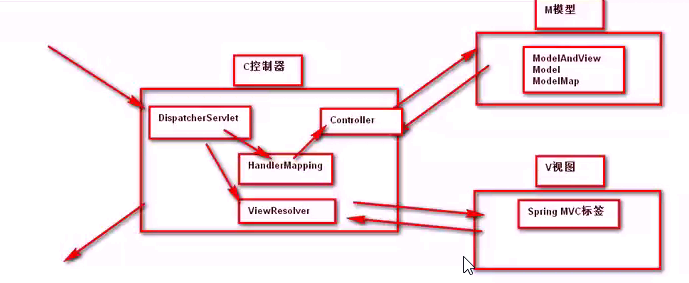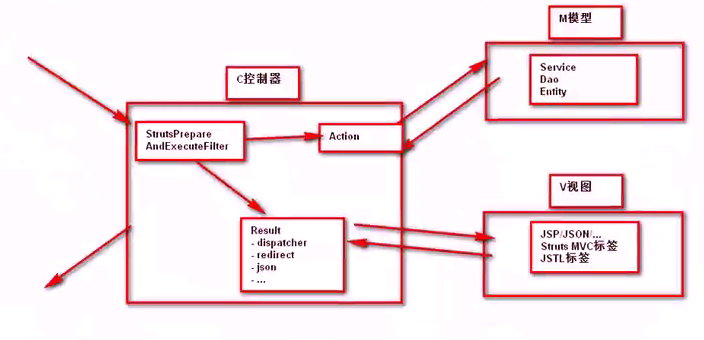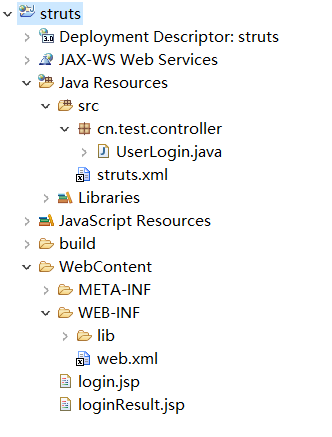1,Struts2简介
struts1和struts2都是由Apache组织发布的,但是比较有趣的是struts2和struts1并没有“血缘关系”。在Apache发布struts1之后,当时是还是非常流行的,但是随着时间推荐,这时候struts1暴露的问题就越来越多了,在这个时候opensymphony组织发布了WebWork框架,WebWork框架在当时适应的很好。opensymphony组织由于向外推广的力度不够,使得WebWork不能很快的面向大众。这个时候Apache组织联合opensymphony组织发布了struts2,因此struts2和struts1联系并不大。在struts2刚发布出来的时候,许多的类库都是直接使用struts1的。
2,Struts2和SpringMVC对比
struts2和springMVC结构非常相似,都是基于MVC结构的。就连配置都很相似,关于SpringMVC和Spring的知识可以参见http://www.cnblogs.com/HDK2016/category/918254.html。
下面给两种图片,分别是springMVC和struts2的结构流程图。
SpringMVC流程图:

struts2流程图:

通过这两张图片的对比可以看出。
struts2中的 StrutsPrepareAndExecuteFilter 相当于 SpringMVC中的 DispatcherServlet。
struts2中的 Action 相当于 SpringMVC 中的 Controller
struts2中的 result 相当于 SpringMVC 中的 ViewResovler
3,Struts2框架的搭建
首先应该下载jar包,将jar包导入到项目的lib目录下面。

web.xml 文件

<?xml version="1.0" encoding="UTF-8"?> <web-app xmlns:xsi="http://www.w3.org/2001/XMLSchema-instance" xmlns="http://java.sun.com/xml/ns/javaee" xsi:schemaLocation="http://java.sun.com/xml/ns/javaee http://java.sun.com/xml/ns/javaee/web-app_3_0.xsd" version="3.0"> <display-name>struts</display-name> <welcome-file-list> <welcome-file>index.html</welcome-file> <welcome-file>index.htm</welcome-file> <welcome-file>index.jsp</welcome-file> <welcome-file>default.html</welcome-file> <welcome-file>default.htm</welcome-file> <welcome-file>default.jsp</welcome-file> </welcome-file-list> <filter> <filter-name>struts</filter-name> <filter-class>org.apache.struts2.dispatcher.ng.filter.StrutsPrepareAndExecuteFilter</filter-class> </filter> <filter-mapping> <filter-name>struts</filter-name> <url-pattern>*</url-pattern> </filter-mapping> </web-app>
由于struts2默认只处理有以.action结尾或是无后缀的url,所以计算web.xml中过滤器不过滤url,也会有url的限制,一般在struts2项目中不再web.xml中过滤url。web.xml会默认在加载src目录下的struts.xml文件。注意文件名称不要改变,否则的话也可以在web.xml中指定struts.xml的位置。
struts.xml 文件

<?xml version="1.0" encoding="UTF-8" ?> <!DOCTYPE struts PUBLIC "-//Apache Software Foundation//DTD Struts Configuration 2.1.7//EN" "http://struts.apache.org/dtds/struts-2.1.7.dtd"> <struts> <!--Struts默认只会通过.action和无后缀的请求,我们可以通过指定extension来使得Struts只通过.do的URL的请求。--> <constant name="struts.action.extension" value="do"/> <!-- 必须继承struts-default,才能使用Result组件 --> <package name="user" extends="struts-default"> <!-- name请求名;class是Action类名;method是Action方法名,默认execute --> <action name="userlogin" class="cn.test.controller.UserLogin"> <!-- name对应action返回值;type指定Result 类型 --> <result name="result" type="dispatcher">loginResult.jsp</result> </action> </package> </struts>
我们在struts.xml文件中使用<constant>覆盖了默认了文件扩展名,使得只处理以.do的url,如果想接受多个,那么以逗号隔开。比如: value="do,action,," ,就可以处理以.do,.action和无后缀的url了。
UserLogin.java 文件

package cn.test.controller;
public class UserLogin {
/*
*struts中规定,接受页面传过来的值和发送到页面中值都通过声明全局变量,然后通过setter和getter方法完成。
*/
private String username;//名字可要页面传过来的值一致,否则不能正确接受值
private String password;
private String resultmessage;//返回值
public String getUsername() {
return username;
}
public void setUsername(String username) {
this.username = username;
}
public String getPassword() {
return password;
}
public void setPassword(String password) {
this.password = password;
}
public String getResultmessage() {
return resultmessage;
}
public void setResultmessage(String resultmessage) {
this.resultmessage = resultmessage;
}
public String execute(){
if("张三".equals(username) && "123456".equals(password)){
resultmessage="登录成功";
}else{
resultmessage="登录失败";
}
return "result";
}
}
Struts2规定,从页面接受值和传送值到页面都是通过全局变量来实现的。然后控制器中方法的返回值只有两种,一种是Sting,另一中就是void。
login.jsp 文件

<%@ page language="java" contentType="text/html; charset=utf-8" pageEncoding="utf-8"%> <!DOCTYPE html PUBLIC "-//W3C//DTD HTML 4.01 Transitional//EN" "http://www.w3.org/TR/html4/loose.dtd"> <html> <head> <meta http-equiv="Content-Type" content="text/html; charset=utf-8"> <title>用户登录</title> </head> <body> <form action="userlogin.do" method="POST"> 用户名:<input type="text" name="username"/><br/> 密码:<input type="password" name="password"/><br/> <input type="submit" value="提交"/> </form> </body> </html>
loginResult.jsp 文件

<%@ page language="java" contentType="text/html; charset=utf-8" pageEncoding="utf-8"%> <!DOCTYPE html PUBLIC "-//W3C//DTD HTML 4.01 Transitional//EN" "http://www.w3.org/TR/html4/loose.dtd"> <html> <head> <meta http-equiv="Content-Type" content="text/html; charset=utf-8"> <title>用户登录</title> </head> <body> ${resultmessage} </body> </html>
到这里我们就配置一个简单的用户登录的struts2框架了。
